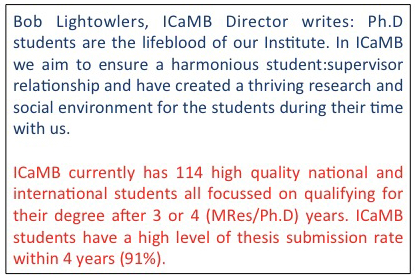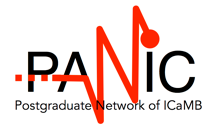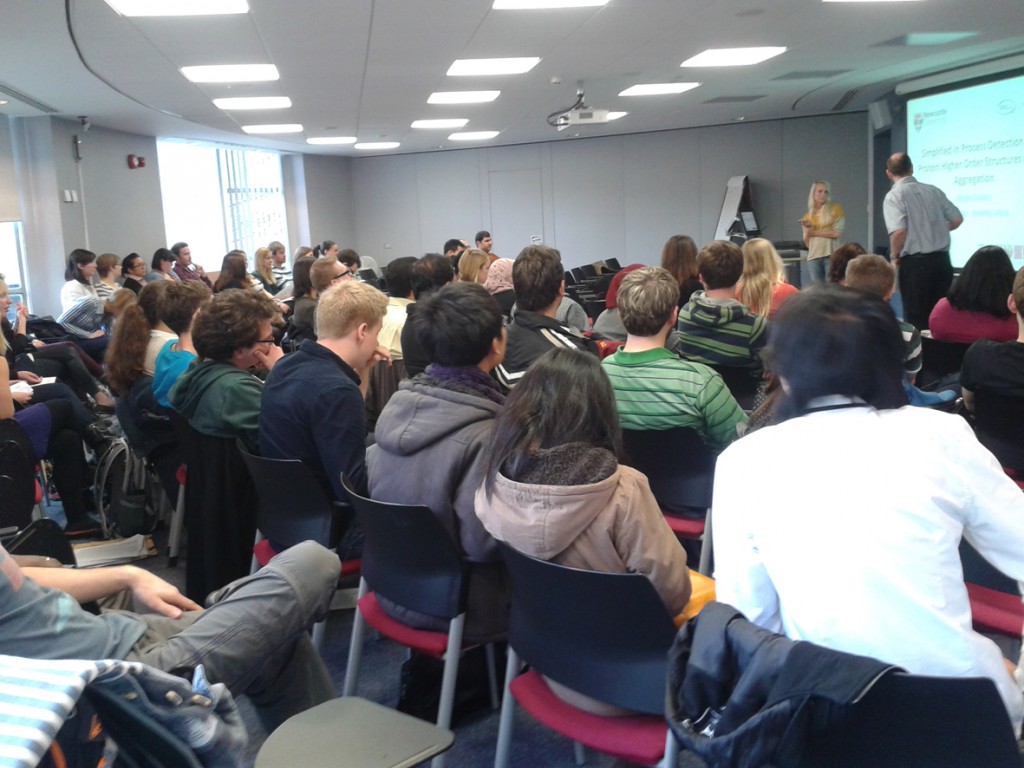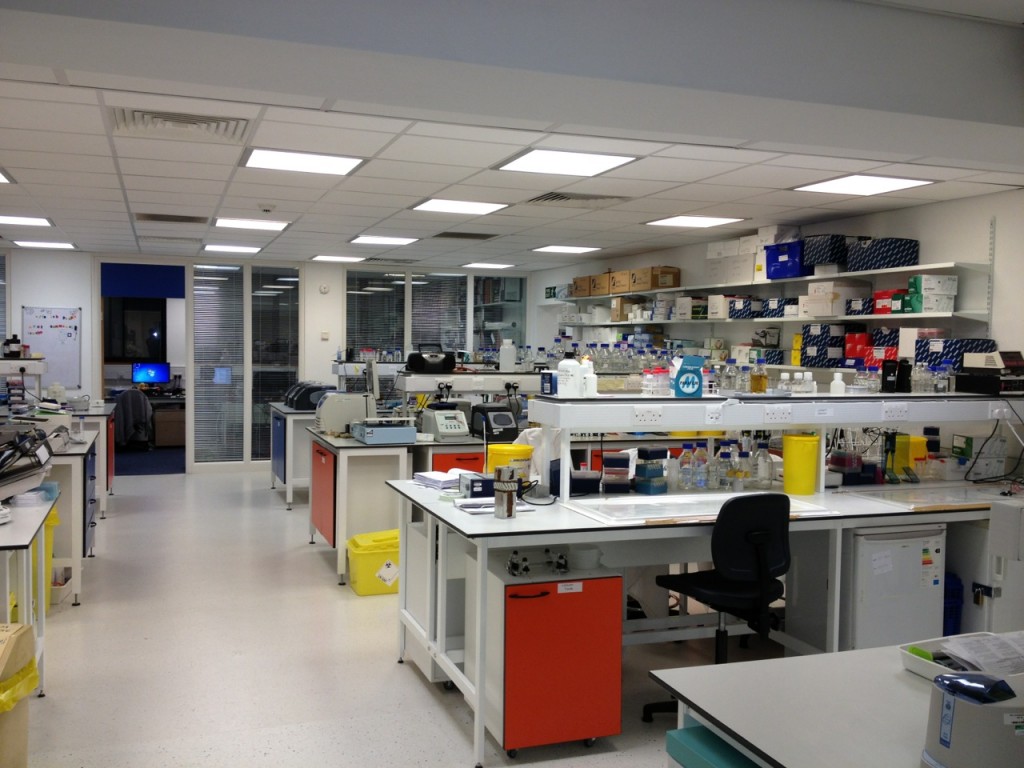PhD student recruitment season is upon us. If you or maybe someone you know is interested in a doing PhD in Cell and Molecular Biosciences in a leading UK Research Institute (that happens to be based in one of the most exciting yet affordable cities in the UK), then read on. This year we are giving you an early preview of the opportunities available in ICaMB and telling you a bit about who we are and what doing your PhD here with us has to offer.
 ICaMB PhD students benefit from being in a dynamic and well funded research environment with access to state of the art technology. Our research interests cover the cutting edge of bacterial cell biology all the way through to eukaryotic cell signalling and cancer research. ICaMB investigators have been awarded £39.32M since 2008, which includes major funding from the Wellcome Trust, the ERC, BBSRC, The Royal Society, Cancer Research UK, Leukemia and Lymphoma Research and the Association of International Cancer Research.
ICaMB PhD students benefit from being in a dynamic and well funded research environment with access to state of the art technology. Our research interests cover the cutting edge of bacterial cell biology all the way through to eukaryotic cell signalling and cancer research. ICaMB investigators have been awarded £39.32M since 2008, which includes major funding from the Wellcome Trust, the ERC, BBSRC, The Royal Society, Cancer Research UK, Leukemia and Lymphoma Research and the Association of International Cancer Research.
PhD students do not exist on experiments alone and the ICaMB PhD student association PAN!C helps to facilitate social as well as scientific interactions. You can read more about PAN!C in a previous ICaMB blogpost.
Below we have listed the MRes/PhD Studentships scheduled to begin in ICaMB in September 2014. These are also listed on the ICaMB website, where they will shortly be formally advertised. Further details of the projects and guidelines on how to apply, will be posted in the next few weeks. However, if you would like further details about the projects NOW you can contact the named supervisor directly or the ICaMB Postgraduate Tutor Dr Tim Cheek (email tim.cheek@ncl.ac.uk). In exceptional circumstances, especially if the prospective applicant already has interviews arranged at other institutions, we can expedite and fast track the interview process (please contact Tim Cheek for more details if this applies to you).
Eukaryotic Cell Biology
The last year has seen a lot of recruitment activity in ICaMB, one result of which was the appointment of three new PIs as part of our Independent Researcher Establishment Scheme (IRES). We introduced Dr Owen Davies, Dr Niall Kenneth and Dr Josana Rodriguez recently. Doing PhD research with a new PI offers the chance to work at the bench directly with a young and enthusiastic scientist at the top of their game. Many ‘first’ PhD students go on to achieve great things. There was great competition for our IRES positions and a PhD position with any of these new PIs promises to be a rewarding experience.
Title of Studentship: Uncovering the molecular basis of homologous chromosome synapsis by the synaptonemal complex during mammalian meiosis
Funding Source: BBSRC DTP
Supervisor: Dr Owen Davies (email owen.davies@ncl.ac.uk)
Title of Studentship: What are the protective roles of XIAP in the response to oxidative stress?
Funding Source: BBSRC DTP
Supervisor: Dr Niall Kenneth (email niallk@med.umich.edu)
Title of Studentship: Understanding microtubule dependent signalling in the generation of cellular asymmetries
Funding Source: BBSRC DTP
Supervisor: Dr Josana Rodriguez (email josanarsl@googlemail.com)
We also have PhD studentships available with Prof Brian Morgan and Dr Elizabeth Veal. Both PIs are investigating the important area of oxidative stress signalling (relevant to many diseases, including cancer) using the model organisms Saccharomyces cerevisiae and Caenorhabditis elegans and publish routinely in high impact journals, such as Molecular Cell. A PhD in either lab provides an opportunity to work at the cutting edge of research into eukaryotic cell signalling.
Title of Studentship: How does the regulation of ubiquitin/ubiquitin-like pathways determine cellular responses to reactive oxygen species?
Funding Source:BBSRC DTP
Supervisor: Prof Brian Morgan (email brian.morgan@ncl.ac.uk)
Title of Studentship: Understanding how hydrogen peroxide signals control cell growth, survival and ageing
Funding Source: BBSRC DTP
Supervisor: Dr Elizabeth Veal (email elizabeth.veal@ncl.ac.uk)
Host-Microbe Interactions
The next two positions complement each other, with one exploring the host’s reaction to microbes while the second focusses on the microbe’s response to the host. Dr Judith Hall and Dr David Bolam are both key members of ICaMB and have a strong track record as PhD supervisors. So if you have an inclination towards exploring innate immunity or diving into the growing community of microbiologists interested in the microflora that interacts with us on a daily basis, maybe one of these two posts is for you.
Title of Studentship: Dissecting the role of the Dectin-1 Receptor in the Innate Defences of the Uro-genital Tract
Funding Source: Dr William Edmund Harker Foundation
Supervisor: Dr Judith Hall (email judith.hall@ncl.ac.uk)
Title of Studentship: Understanding how the mucosal layer is a microbial niche within the gut microbiota
Funding Source: BBSRC DTP
Supervisor: Dr David Bolam (email david.bolam@ncl.ac.uk)
Bacterial Cell Biology
The final two positions are both located in the Centre for Bacterial Cell Biology, affiliated to ICaMB. You can read up on our work on bacterial cell biology in previous posts including our investigations with bulging bacterial cells to explain division, how we explode bacteria for science, or highlighting a recent paper from Nikolay published in the prestigious journal Science. In addition, Yulia Yuzenkova was recently awarded a prestigious Royal Society University Research Fellowship and her research was featured on the ICaMB blog.
Title of Studentship: Cyanobacterial transcription machinery
Funding Source: BBSRC DTP
Supervisor: Dr Yulia Yuzenkova (email yulia.yuzenkova@ncl.ac.uk)
Title of Studentship: Bacterial immunity and multi-drug resistance
Funding Source: BBSRC DTP
Supervisor: Prof Nikolay Zenkin (email nikolay.zenkin@ncl.ac.uk)



